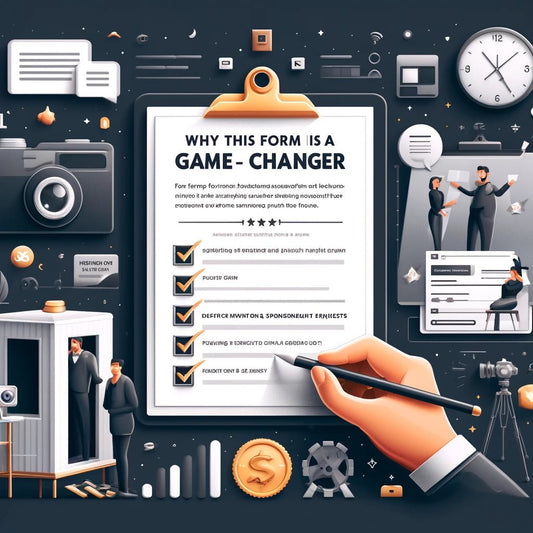
A Comprehensive Guide to Successful Corporate Event Planning
Share
.jpg)
Corporate event planning involves the organization and execution of various events for businesses and organizations. It is a strategic process that includes careful planning, coordination, and management of all aspects of an event to ensure its success. Corporate events can range from conferences and seminars to product launches, trade shows, company retreats, award ceremonies, and charity events.
The purpose of corporate event planning is to create a memorable and impactful experience for attendees that aligns with the objectives and goals of the organization. It provides opportunities for networking, brand promotion, knowledge sharing, team building, and fostering relationships with clients and partners.
Corporate event planning is important because it helps businesses achieve their goals and objectives, enhances brand reputation, strengthens relationships with stakeholders, and provides a platform for showcasing products, services, and thought leadership.
Key elements of corporate event planning include setting clear objectives, choosing the right venue, creating a budget, developing a timeline, creating an event program, managing logistics, hiring and coordinating vendors, marketing and promotion, and ensuring attendee experience.
However, corporate event planning comes with its own set of challenges. These include managing time constraints, budgeting and cost control, effective communication and collaboration, risk management, and ensuring attendee satisfaction. By addressing these challenges and following best practices, event planners can ensure the success of corporate events and create a positive impact for businesses and organizations.
What is Corporate Event Planning?
Corporate event planning, often referred to as corporate event management, encompasses the organization and execution of various events for a company. These events may include conferences, product launches, and team building activities. The process involves several essential steps, such as budgeting, venue selection, logistics management, and coordination with vendors. By paying meticulous attention to detail, having strong organizational skills, and employing effective communication, event planners strive to create engaging and successful events that align with the company's objectives. Moreover, they aim to leave a positive and lasting impression on attendees. Notably, the corporate event planning industry is a thriving and continuously growing sector, valued in the multi-billion-dollar range.What is the Purpose of Corporate Event Planning?
The purpose of corporate event planning is to organize and execute events that serve specific objectives for a company. These events, such as conferences, product launches, trade shows, and more, aim to create opportunities for networking, brand exposure, employee engagement, and business growth. The main goal is to carefully manage all aspects of an event, including venue selection, budgeting, timeline development, vendor coordination, and marketing, to achieve desired outcomes. Effective event planning allows companies to enhance their reputation, build relationships, and successfully achieve their business goals.
Why is Corporate Event Planning Important?
Corporate event planning is important for several reasons. Why is Corporate Event Planning Important? Proper planning ensures efficient and smooth execution of corporate events, minimizing the chances of any issues or hiccups. Planning helps in clearly defining the objectives of the event and ensures that these goals are achieved through careful organization. Well-planned corporate events can enhance a company's reputation and brand image, creating positive impressions on attendees. Events provide a platform for networking and building valuable connections with clients, partners, and industry professionals. Well-executed events can boost employee morale, foster teamwork, and create a positive work culture.
Key Elements of Corporate Event Planning
When it comes to corporate event planning, understanding the key elements can make all the difference. Setting clear objectives, choosing the right venue, creating a budget, and developing a timeline are just a few of the crucial components that contribute to a successful event. With careful consideration of logistics, hiring and coordinating vendors, effective marketing and promotion, and ensuring an unforgettable attendee experience, the art of corporate event planning becomes a masterpiece. Let's dive into these key elements to unlock the secrets behind a truly remarkable event.Setting Clear Objectives
- Setting clear objectives is crucial in corporate event planning to ensure a successful outcome.
- Here are steps to follow:
- Identify the purpose of the event and what you hope to achieve.
- Define specific and measurable objectives that align with the overall goals of the event.
- Consider the target audience and tailor the objectives accordingly.
- Ensure that the objectives are realistic and attainable within the given resources and constraints.
- Communicate the objectives clearly to all stakeholders involved in the planning process.
- Develop a strategy and action plan to achieve each objective.
- Regularly review and evaluate progress towards the objectives and make adjustments as necessary.
Choosing the Right Venue
When it comes to organizing a corporate event, the selection of the appropriate venue plays a pivotal role in ensuring the success of the occasion. Keep in mind the following criteria in making your choice:
- Capacity: Take into account the comfort of all attendees by selecting a venue that can accommodate the number of people expected to attend.
- Accessibility: Opt for a venue that is easily reachable for all participants, with ample parking space or accessible public transportation options.
- Ambiance: Align the choice of venue with the desired theme or atmosphere that you aim to create for your event.
- Facilities and amenities: Consider the availability of essential facilities and amenities, such as audiovisual equipment, Wi-Fi, and catering services, when evaluating potential venues.
- Location: Prioritize a centrally-located venue that is convenient for the majority of attendees.
- Cost: Take into consideration your budget and compare the prices offered by different venues in order to find one that offers good value for the money.
By thoroughly considering these factors, you can choose the most suitable venue that will enhance the overall experience for attendees and ultimately contribute to the success of your corporate event.
Creating a Budget
Creating a budget is a critical aspect of successful corporate event planning. Here is a comprehensive list of steps to assist you in crafting a budget for your event:
- Begin by estimating the overall cost of the event, encompassing expenses such as venue rental, catering, entertainment, and marketing.
- Next, break down the budget into different categories and allocate funds accordingly.
- To obtain the best deals, conduct thorough research and compare prices for various vendors and services.
- Ensure you account for any unexpected costs, such as taxes or unforeseen expenses, in your budget.
- Throughout the planning process, regularly monitor and update your budget to stay within your financial boundaries.
To create a budget, consider the following suggestions:
- Explore alternative options, such as negotiating prices or seeking sponsorships, to cut costs.
- Set aside a contingency fund to cover any unforeseen expenses that may arise.
- Maintain meticulous expense tracking to have precise records for future reference.
Developing a Timeline
- Developing a timeline is a crucial step in corporate event planning. It ensures that all tasks are completed on time and helps in effective event management.
- Identify event date and time: Determine the exact date and time for the event.
- Breakdown tasks: Make a list of all the tasks needed to plan and execute the event.
- Assign deadlines: Assign specific deadlines for each task to ensure timely completion.
- Sequence tasks: Arrange tasks in a logical order, considering dependencies and priorities.
- Allocate resources: Determine the resources required for each task, such as budget, manpower, and materials.
- Create milestones: Set milestones to track progress and ensure important deadlines are met.
- Regularly review and update: Continuously review and update the timeline as needed to accommodate any changes or adjustments.
Creating an Event Program
Creating an Event Program is a critical step in successful corporate event planning. To ensure a well-organized and engaging program, it is important to follow these steps:
- Identify event objectives: When Creating an Event Program, it is essential to determine the goals and desired outcomes of the program.
- Define target audience: It is crucial to understand the demographics, interests, and needs of the attendees in order to tailor the program accordingly.
- Select event format: When Creating an Event Program, it is important to decide on the type of program, whether it involves presentations, panel discussions, workshops, or a combination of these activities.
- Curate content: When Creating an Event Program, it is important to develop a schedule of sessions or activities that align with the event objectives and meet the expectations of the audience.
- Arrange speakers and presenters: Inviting industry experts or thought leaders who can add value to the Event Program is crucial.
- Allocate time slots: Allocating appropriate durations for each session, including breaks and networking opportunities, is essential when Creating an Event Program.
- Create a visual flow: Designing a logical and visually appealing program layout that makes it easy for attendees to navigate is important when Creating an Event Program.
- Engage attendees: Incorporating interactive elements like Q&A sessions, polls, or networking activities can enhance attendee engagement in the Event Program.
- Include event logistics: It is important to communicate essential logistical details such as time, location, transportation, and any special instructions when Creating an Event Program.
- Communicate changes: Flexibility is key when Creating an Event Program, and it is important to be prepared to make necessary adjustments and inform attendees promptly of any changes.
Managing Logistics
Managing logistics is a critical component of successful corporate event planning. It entails the coordination of various tasks and resources to guarantee a smooth and efficient event. Here are some key elements to consider when managing logistics:
- Venue arrangement: Managing logistics involves securing a suitable venue that meets the event's requirements, such as capacity, location, and amenities.
- Equipment and supplies: Managing logistics requires arranging the necessary equipment, such as audiovisual systems, lighting, and signage. It is important to ensure that all required supplies, including name tags and stationery, are readily available.
- Transportation and accommodation: An integral part of managing logistics is coordinating transportation for attendees, if needed. It also involves arranging accommodation for participants coming from out of town.
- Catering and refreshments: Managing logistics includes organizing catering services and ensuring appropriate menus that can accommodate dietary restrictions.
- On-site coordination: In managing logistics, it is essential to assign staff to handle registration, guide attendees, and address any on-site issues that may arise.
To smoothly manage logistics for an event, consider the following suggestions:
- Create a detailed checklist to keep track of tasks and deadlines, aiding in the management of logistics.
- Communicate effectively with all stakeholders involved in logistics management.
- Conduct thorough site visits to familiarize yourself with the venue layout and anticipate any potential challenges that may impact logistics management.
- Build relationships with reliable vendors and suppliers to ensure the seamless execution of logistics management.
- Have a contingency plan in place to address unforeseen circumstances and effectively manage logistics during the event.
Effective logistics management is vital to ensure a seamless and successful corporate event.
Hiring and Coordinating Vendors
When it comes to corporate event planning, the process of hiring and coordinating vendors plays a vital role in ensuring a successful and seamless event. Here are some key considerations to keep in mind:
- First and foremost, it is essential to research and identify reputable vendors who specialize in the services you require, whether it's catering, audiovisual equipment, or event decor.
- Next, you should request proposals from multiple vendors and carefully compare their offerings, pricing, and past client reviews.
- Once you have selected your vendors, it is crucial to clearly communicate your event needs and expectations to them. Make sure you provide specific requirements, timelines, and budget constraints.
- Afterward, it is advisable to establish a contract or agreement with the vendors. This agreement should outline the deliverables, payment terms, and cancellation policies.
- To ensure a smooth planning process, it is important to maintain regular communication and coordination with the vendors. This will help keep everyone aligned and enable you to address any issues promptly.
- Additionally, it is always wise to have a backup plan in case of any vendor-related emergencies or last-minute changes.
- Lastly, it is crucial to provide feedback to your vendors and express gratitude for their services. This will help maintain positive relationships for future events.
Marketing and Promotion
Marketing and promotion are essential components of corporate event planning as they play a crucial role in creating awareness, generating excitement, and attracting attendees. To effectively market and promote a corporate event, take into account the following key points:
- Develop a comprehensive marketing strategy that encompasses both online and offline channels. - Craft engaging content, including social media posts, blog articles, and videos, to highlight the value and benefits of the event. - Utilize email marketing to reach out to potential attendees and keep them updated on event developments. - Collaborate with influencers or industry experts to endorse the event and increase its reach. - Consider utilizing paid advertising on platforms like Google Ads or social media ads to target specific demographics. - Leverage partnerships with relevant organizations or media outlets to expand the event's reach through co-branding and promotional activities. - Use event marketing tools and technologies to track the effectiveness of promotional efforts and make data-driven improvements. By implementing a comprehensive marketing and promotion strategy, corporate events can successfully reach their target audience and attract maximum participation.Ensuring Attendee Experience
Ensuring a positive attendee experience is crucial for successful corporate events. By prioritizing attendee experience, you can create an event that leaves a lasting positive impression on attendees. Here are some key factors to consider:
- Engaging Content: Plan informative and interactive sessions to keep attendees involved and interested in order to ensure a positive attendee experience.
- Networking Opportunities: Provide designated spaces and activities to facilitate networking and relationship-building among attendees, thus ensuring attendee experience.
- Comfortable Environment: Enhance attendee comfort by ensuring comfortable seating, appropriate temperature and lighting, and accessible amenities.
- Seamless Organization: To ensure a smooth and enjoyable experience for attendees, prioritize well-planned logistics, clear communication, and efficient registration processes.
- Feedback Collection: Gain valuable insights and improve future events by encouraging feedback from attendees, thus enhancing attendee experience.
Remember, ensuring attendee experience is essential for the success of corporate events.
Types of Corporate Events
When it comes to corporate events, the possibilities are diverse and exciting. From conferences and product launches to trade shows and company retreats, the options for businesses to create impactful experiences are limitless. Add to that the glamour of award ceremonies and the joy of charity events, and you have a world of corporate event planning waiting to be explored. Join us as we dive into the different types of corporate events, uncovering the distinct purposes and thrilling opportunities they bring.Conferences and Seminars
Conferences and seminars are vital types of corporate events that offer exceptional possibilities for knowledge sharing, networking, and professional development. When organizing these events, it is important to consider the following factors:
1. Establish the purpose: It is crucial to clearly define the objectives and desired outcomes of the conference or seminar.
2. Choose an appropriate venue: Select a venue that can comfortably accommodate the expected number of attendees and provides the necessary facilities for presentations and workshops.
3. Create a comprehensive program: Develop a schedule that encompasses keynote speakers, workshops, panel discussions, and networking sessions.
4. Coordinate logistics: Make arrangements for transportation, accommodation, and catering to ensure smooth operations throughout the event.
5. Invite high-quality speakers: Engage experts in the respective field to deliver informative and captivating presentations to the participants.
6. Ensure a seamless registration: Implement an efficient registration and ticketing system to facilitate easy check-in and ensure a seamless entry to the event.
7. Enhance the experience of the attendees: Offer opportunities for interactive sessions, Q&A panels, and networking breaks to encourage active participation and promote effective learning.
Fact: According to Event Manager Blog, 78% of event professionals believe that face-to-face meetings at conferences and seminars are crucial for building strong business relationships.
For more information on corporate event planning, check out this reputed source.
Product Launches
- Product launches are a crucial aspect of corporate event planning. To ensure a successful product launch, follow these steps:
- Define Objectives: Clearly outline the goals and objectives for the product launch.
- Choose the Right Venue: Select a venue that aligns with the product launch and target audience.
- Create a Budget: Allocate funds for venue, catering, marketing, and any other necessary expenses for the product launch.
- Create a Timeline: Develop a timeline that includes pre-launch activities, launch day, and post-launch follow-up for the product launch.
- Develop an Event Program: Plan activities, speeches, and demonstrations to engage the audience during the product launch.
- Coordinate Logistics: Arrange for equipment setup, signage, audio-visual needs, and any required permits for the product launch.
- Hire and Coordinate Vendors: Work with vendors for catering, decor, event technology, etc., for the product launch.
- Market and Promote: Utilize various marketing channels to generate buzz and attract attendees to the product launch.
- Ensure Attendee Experience: Provide a seamless experience by managing registration, check-in, and customer service during the product launch.
Trade Shows
Trade shows are a crucial type of corporate event that enable businesses to display their products or services to a targeted audience. Here are some essential factors to consider when planning a trade show:
- Choose the right venue: Opt for a venue that is easily accessible, provides ample space for exhibitors and attendees, and offers necessary facilities.
- Invite relevant exhibitors: Ensure that the exhibitors at the trade show are aligned with the event's theme or industry to attract the appropriate audience.
- Create an engaging layout: Design the trade show floor layout in a manner that encourages attendee flow and fosters interaction with exhibitors.
- Promote the event: Leverage various marketing channels and strategies to raise awareness and attract potential attendees to the trade show.
- Offer educational sessions: Enhance the value of the trade show by organizing informative and captivating sessions or workshops related to the industry.
- Provide networking opportunities: Set up networking sessions or designated areas where attendees can connect and foster business relationships.
By incorporating these considerations, you can ensure a successful trade show event that effectively showcases businesses and attracts the right audience.
Company Retreats
Company retreats are a popular form in corporate events that offer organizations the opportunity to bring employees together in a relaxed and informal setting. They are designed to foster team building, enhance communication, and boost employee morale. When planning company retreats, consider the following:
- Define objectives: Clearly outline the goals and outcomes you want to achieve during the company retreats.
- Choose the right location: Select a venue that aligns with your objectives and offers amenities for team building activities.
- Create a balanced itinerary: Plan a mix of structured team building exercises, workshops, and free time for relaxation during the company retreats.
- Encourage participation: Involve all employees and provide opportunities for them to contribute ideas and suggestions during the company retreats.
- Evaluate and follow up: Assess the success of the company retreats and implement any necessary changes for future events.
True story: XYZ Corp. organized an annual retreat in a beautiful mountain resort. Through team-building activities like hiking and group challenges, employees developed strong bonds and improved communication. The company retreats resulted in increased collaboration and productivity, leading to the successful completion of a challenging project.
Award Ceremonies
Award ceremonies are a special type of corporate event that celebrates achievements and recognizes individuals or organizations for their excellence. When planning an award ceremony, there are some key considerations to keep in mind.
First and foremost, it is important to choose a theme that aligns with the purpose of the event and creates a festive atmosphere. The theme will set the tone for the entire ceremony, so it should be carefully selected.
Next, finding the right venue is crucial. The venue should be able to accommodate the number of attendees and offer the necessary facilities for the ceremony. It should be a place where the ceremony can be held smoothly and without any issues.
Another important aspect to consider is the award categories and nominations. It is important to determine the different award categories and establish a fair and transparent nomination process. This will ensure that deserving individuals or organizations are recognized for their excellence.
A well-structured program is also essential for a successful award ceremony. The program should include speeches, performances, and the announcement and presentation of awards. It should be organized in a way that keeps the audience engaged and entertained throughout the event.
Decorations and ambiance play a crucial role in creating an elegant and celebratory atmosphere. The venue should be enhanced with appropriate decorations and lighting to set the mood for the ceremony.
To make the ceremony more engaging and entertaining, consider incorporating live entertainment or interactive elements. This will help to keep the guests entertained and create a memorable experience for them.
The award design and branding should also be given special attention. The awards should be visually appealing and personalized, reflecting the event's brand and significance. Please refer to Corporate event planning for more information.
Lastl
Charity Events
Charity events are an essential aspect to consider when planning corporate events. These events not only provide companies with an opportunity to give back to the community but also enhance their brand image. To plan a successful charity event, the following steps should be taken into account:- Identify the cause: It is important to select a cause or charity that aligns with your company's values and goals.
- Create a fundraising strategy: Determine how funds will be raised during the event, such as through ticket sales, auctions, or sponsorships.
- Engage volunteers: Recruit volunteers to assist with event logistics, promotion, and fundraising efforts.
- Build partnerships: Collaboration with local businesses or organizations can maximize fundraising potential and community support.
- Publicize the event: Utilize various marketing strategies including social media, press releases, and email campaigns to spread the word and attract attendees.
- Show appreciation: It is important to acknowledge and thank attendees, sponsors, and volunteers for their participation and contributions.
Challenges and Tips for Successful Corporate Event Planning
Planning a successful corporate event comes with its fair share of challenges. From juggling time constraints to sticking to a budget, effective communication to risk management, and ensuring attendee satisfaction, there's a lot on the plate. In this section, we'll dive into the nitty-gritty of corporate event planning, exploring tips and tricks to tackle each aspect and overcome these hurdles seamlessly. So, buckle up as we navigate the exciting yet demanding world of event planning, leaving no stone unturned to deliver an unforgettable experience.Managing Time Constraints
- Successfully managing time constraints is crucial in corporate event planning.
- To effectively manage time, it is important to set clear objectives and prioritize tasks.
- Create a detailed timeline and schedule, allocating specific time for each task.
- Break down larger tasks into smaller, manageable sub-tasks to better manage time.
- Delegate responsibilities to a competent team to share the workload and improve time management.
- Regularly communicate and coordinate with team members to ensure progress and address any potential delays.
- Implement efficient time management techniques, such as utilizing project management software or setting strict deadlines.
- Anticipate potential delays or obstacles and have contingency plans in place to mitigate the impact on time constraints.
- Continuously monitor progress and adjust the timeline or allocate additional resources if necessary to meet all deadlines.
Budgeting and Cost Control
When it comes to corporate event planning, budgeting and cost control are crucial elements to consider. Proper financial management ensures that the event stays within budget and maximizes resources. It is important to set a realistic budget and determine the available funds, allocating them wisely for various aspects of the event. Tracking expenses is essential to ensure transparency and avoid overspending. Negotiating with vendors by seeking multiple quotes and negotiating prices allows us to get the best deals and stay within budget. Prioritizing the essential components of the event and allocating more funds to them while cutting costs on non-essential elements is also important. Additionally, considering alternative options and looking for cost-effective alternatives that still meet the event's objectives without compromising quality can help in cost control. Monitoring and adjusting the budget throughout the planning process is crucial to maintain financial control.
Effective Communication and Collaboration
Effective communication and collaboration are crucial elements in successful corporate event planning.
- In order to ensure everyone is on the same page regarding event objectives, timelines, and expectations, it is important to regularly communicate with stakeholders.
- To foster collaboration among team members, clear roles and responsibilities should be assigned, regular meetings should be conducted, and progress updates should be provided.
- For a smooth working relationship with vendors, it is essential to establish open lines of communication and address any issues promptly.
- To keep attendees informed and engaged before, during, and after the event, effective communication channels like social media or event apps should be utilized.
- Seeking feedback from all stakeholders is important to identify areas for improvement and address any issues that emerged during the planning process.
Risk Management
Risk management is an integral part of corporate event planning to ensure the smooth execution of an event and mitigate any potential issues that may arise.
- Identify potential risks: Conduct a thorough assessment of the event to identify any possible risks, such as technical difficulties, weather conditions, or security concerns.
- Mitigation strategies: Develop strategies to mitigate the identified risks, such as having backup plans for technical failures or implementing security measures.
- Contingency plans: Create contingency plans to address unforeseen circumstances, such as a sudden change in the event venue or unexpected emergencies.
- Communication and collaboration: Establish effective communication channels with all stakeholders, including event staff, vendors, and attendees, to ensure everyone is aware of potential risks and the corresponding mitigation measures.
- Regular monitoring: Continuously monitor the event progress and assess the effectiveness of risk management strategies throughout the planning and execution stages.
Ensuring Attendee Satisfaction
Ensuring attendee satisfaction is a crucial aspect of corporate event planning. To achieve this, it is important to consider the following:
- Engaging content: Take the time to plan informative sessions, engaging activities, and interactive workshops. This will help keep attendees interested and involved throughout the event.
- Comfortable environment: To ensure physical comfort, it is important to provide comfortable seating, proper lighting, and temperature control for all attendees.
- Efficient logistics: In order to minimize waiting time and confusion, it is essential to streamline registration, check-in procedures, and the flow of activities.
- Effective communication: Keeping attendees informed about event details, changes, and updates is key. This can be done by maintaining clear and timely communication channels.
- Cater to dietary restrictions: To guarantee that all attendees can enjoy their meals, it is important to offer a variety of food options and accommodate any dietary restrictions.
Looking back in history, the success of the 1927 Solvay Conference can be attributed to its emphasis on ensuring attendee satisfaction. By encouraging collaboration and open discussions, this event successfully brought together renowned physicists such as Einstein and Schrödinger, leading to groundbreaking advancements in quantum mechanics. The focus on creating a comfortable and stimulating atmosphere during the conference laid the foundation for these remarkable scientific breakthroughs.
Frequently Asked Questions
1. How can I plan an effective corporate event to motivate my staff and build brand recognition?
To plan an effective corporate event, start by defining your goals and objectives. Determine what you want to achieve with the event, such as motivating staff, promoting the brand, or strengthening bonds. Consider the preferences of your audience and create an engaging experience that resonates with them. Allocate resources wisely, focusing on factors that will have the most impact, such as skilled speakers or interactive brand experiences. Finally, remember to treat your guests well, as they can become brand ambassadors and help promote your company.
2. What types of corporate events can I organize to reach my target audience and attract future clients?
There are various types of corporate events that can help you reach your target audience and attract future clients. Networking events allow you to connect with potential customers and industry professionals. Trade shows and exhibitions provide an opportunity to showcase your products or services to a wider audience. Conferences and seminars allow you to share knowledge and position your company as a thought leader. Consider your goals and choose the event type that aligns with your objectives and target audience.
3. How can corporate events contribute to my company's growth and improve employee retention?
Corporate events can contribute to your company's growth by generating leads, promoting your brand, and attracting new clients. They can also strengthen internal bonds, motivate employees, and improve employee retention. By celebrating wins and acknowledging team achievements, you create a positive work environment that boosts morale and loyalty. Additionally, corporate events provide a platform for senior leaders to communicate company strategy and engage employees in the company's vision.
4. How can I plan a successful corporate event that resonates with my audience and exceeds their expectations?
To plan a successful corporate event that resonates with your audience, it is important to understand their expectations and preferences. Research and gather feedback to identify what they value and find engaging. Tailor your event program and activities to cater to their needs. Create an interactive and memorable experience that goes beyond the usual corporate affair. By focusing on genuine connections, engaging content, and meeting attendee preferences, you can ensure an event that exceeds expectations.
5. How can I use corporate events as part of wider marketing initiatives to promote my brand?
Corporate events can be an integral part of wider marketing initiatives to promote your brand. Consider integrating your event with digital marketing efforts, leveraging social media and online platforms to create buzz and attract attendees. Use the event as an opportunity to showcase your company's values and unique selling points. Collaborate with sponsors or exhibitors to expand your reach and generate additional exposure. By aligning your corporate event with your overall marketing strategy, you can maximize its impact and promote your brand effectively.
6. How can I measure the success of a corporate event and identify areas for improvement?
To measure the success of a corporate event, it is important to set clear goals and objectives from the beginning. Use key performance indicators (KPIs) such as attendee satisfaction, lead generation, or employee feedback to evaluate the event's effectiveness. Take the time to gather post-event feedback and insights from attendees, sponsors, and other stakeholders. Analyze the data collected and identify areas for improvement. Use the lessons learned to enhance future events and ensure continuous growth and success.






